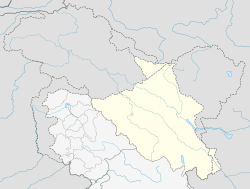Hundar is a village in the Leh district of Ladakh, India, famous for sand dunes and Bactrian camels.[1] It is located in the Nubra tehsil, on the banks of the Shyok River. The Hunder Monastery is located here.
Hundar
Hunder, Hundur | |
|---|---|
Village | |
 | |
| Coordinates: 34°34′33″N 77°29′41″E / 34.575836°N 77.494823°E | |
| Country | India |
| Union Territory | Ladakh |
| District | Leh |
| Tehsil | Nubra |
| Population (2011) | |
• Total | 1,179 |
| Time zone | UTC+5:30 (IST) |
| Census code | 928 |
Hundar was once the capital of the former Nubra kingdom. There are several ruined buildings, including the ruins of the king's palace, the Langchen Khar ("Elephant Palace").[2] There is a fort at the top of the hill, called Gula.[2] Hundar also has two Buddhist temples: the white temple (Lhakhang Karpo) and the red temple (Lhakhang Marpo).[3] Between Hundar and Diskit lie sand dunes.[4]
Demographics
editAccording to the 2011 census of India, Hundar has 269 households. The effective literacy rate (i.e. the literacy rate of population excluding children aged 6 and below) is 60.65%.[5]
| Total | Male | Female | |
|---|---|---|---|
| Population | 1179 | 548 | 631 |
| Children aged below 6 years | 137 | 54 | 83 |
| Scheduled caste | 0 | 0 | 0 |
| Scheduled tribe | 1170 | 540 | 630 |
| Literates | 632 | 341 | 291 |
| Workers (all) | 728 | 341 | 387 |
| Main workers (total) | 267 | 169 | 98 |
| Main workers: Cultivators | 7 | 6 | 1 |
| Main workers: Agricultural labourers | 1 | 1 | 0 |
| Main workers: Household industry workers | 1 | 1 | 0 |
| Main workers: Other | 258 | 161 | 97 |
| Marginal workers (total) | 461 | 172 | 289 |
| Marginal workers: Cultivators | 410 | 143 | 267 |
| Marginal workers: Agricultural labourers | 23 | 6 | 17 |
| Marginal workers: Household industry workers | 1 | 0 | 1 |
| Marginal workers: Others | 27 | 23 | 4 |
| Non-workers | 451 | 207 | 244 |
References
edit- ^ "Blockwise Village Amenity Directory" (PDF). Ladakh Autonomous Hill Development Council. Retrieved 23 July 2015.
- ^ a b Exploring Hundar—the desert wonder of Leh, Panchali Dey, Times of India, Jun 22, 2021
- ^ Prem Singh Jina (1997). Recent Researches on the Himalaya. Indus. pp. 32–. ISBN 978-81-7387-069-9.
- ^ Max Lovell-Hoare; Sophie Lovell-Hoare (1 July 2014). Kashmir: Jammu. Kashmir Valley. Ladakh. Zanskar. Bradt Travel Guides. pp. 113–. ISBN 978-1-84162-396-2.
- ^ a b "Leh district census". 2011 Census of India. Directorate of Census Operations. Retrieved 23 July 2015.

